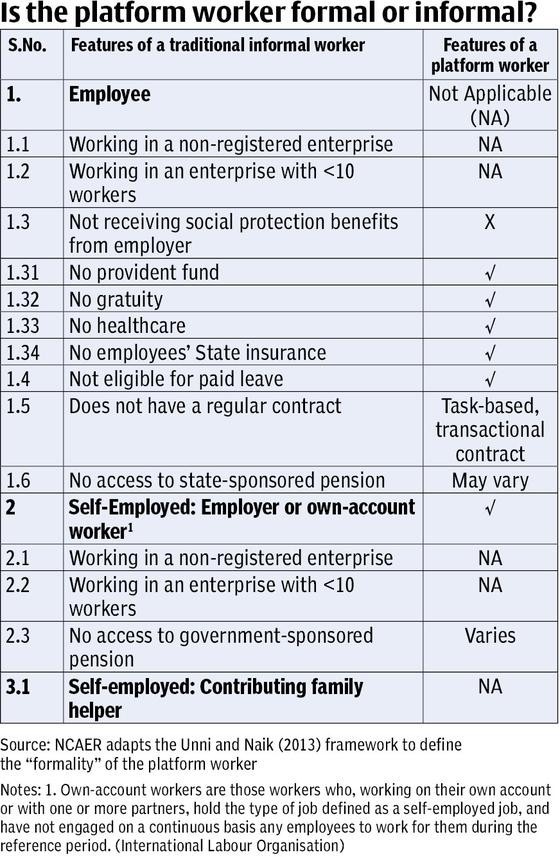Formal work, informal worker
30 Aug 2022
Opinion: Bornali Bhandari Gautam Kumar Das Samarth Gupta Ajaya K Sahu & KS Urs
In the platform economy workers function in a formalised realm but without benefits of tenure or welfare
One of the research questions that the NITI Aayog report ‘India’s Booming Gig and Platform Economy: Perspectives and Recommendations on the Future of Work’ poses is whether platforms are formalising or informalising the economy? We attempt a conceptual answer here. We argue that the platform work moves the economy towards formality. But that does not amount to completely formalising the economy.
What is an informal or unorganised economy? The National Commission for Enterprises in the Unorganised Sector (2007) defined unorganised workers as “those working in the unorganised enterprises or households excluding regular workers with social security benefits and the workers in the formal sector without any employer/social security benefits provided by the employers.”
Unni and Naik (2013) in their article ‘Measuring Informality of Employment in Urban India’ (published in The Indian Journal of Labour Economics. 56(4): 493-508) point out that there is considerable heterogeneity in the urban informal economy in India. There is a continuum of employment relationships (see Table).

Platform work defined
Keeping this in mind let us focus on labour platforms. The Draft Code on Social Security (DCSS) 2020 defines “platform work as a work arrangement outside of a traditional employer- employee relationship in which organisations or individuals use an online platform to access other organisations or individuals to solve specific problems or to provide specific services or any such other activities that may be notified by the Central Government in exchange for payment”.
The platform acts as an intermediary between the service provider and the service seeker. The intermediary is not an employer but helps the service provider land paid tasks. The service provider is the food delivery worker in Zomato/Swiggy the cab driver in the case of Ola/Uber and the beautician/plumber/electrician in the case of Urban Company etc.
The contract between the service provider and the platform is market/transaction based. For example in the case of the food delivery platform sector a worker signs an agreement with the platform that he/she will get paid a particular amount upon delivery of food to a particular location within a particular time.
The tasks and amount that one is going to be paid for that task are pre-decided. The platform reduces transaction (search bargaining and monitoring) costs and bears the burden of transaction failure. It is in a position to verify that the transaction has been completed like Zomato/Swiggy/Ola/Uber.
Unlike the traditional informal economy the intermediary in the platform economy takes the burden of the failure of an exchange between the service provider and service seeker like Ola/Uber.
The working conditions of the worker remains essentially informal but has some ‘formal’ features such as the use of bank accounts as a result of digitised payments.
In contrast there is a contract based on a personalised understanding between a traditional informal worker and a service seeker in the regular economy. This contract becomes self- enforcing due to the mutual trust between the two parties which is formed after repeated interactions.
This holds true for our neighbourhood plumber electrician etc. If any one of the parties reneges from commitment in the transaction the relationship breaks down. This can be costly if future transactions are contingent on the success of current transactions. This creates the incentive for each party to go through the commitment.
The transactional contract (as opposed to a relational contract) makes the work done by a platform worker “formal”. The task and payments associated with it are pre-decided; all parties know the costs of failure. Here the transaction for work also may have a tax component attached as for food delivery. But to reiterate the working conditions are informal.
Whether the platform is just an intermediary or an employer is an empirical question because it will depend on the degree of autonomy the platform workers enjoys in their job. Autonomy is the choice of the worker to decide how where and when to produce. In the US and the UK platform workers in specific platforms have been deemed to be employees rather than independent contractors due to the lack of autonomy. These need to be assessed in India.
In sum the platform worker himself/herself remains informal because he/she has neither employer-provided social welfare support (such as pensions and medical insurance) nor a tenure- based job contract nor access to state pensions. Food delivery platform workers are covered by accident insurance which is a very specific form of medical insurance (covering only on-duty casualties) and not a comprehensive idea of the latter.
A policy conundrum is that if the platform worker actually starts receiving social security either from the employer or the government then will s/he become completely formal? The answer will lie in the details.
Bhandari is a Senior Fellow and Sahu and Urs are Associate Fellows at NCAER; Gupta is an Assistant Professor at Ahmedabad University and Das is a Research Fellow at the National Institute of Urban Affairs. Views are personal
Published in: The Hindu Business Line , 30 Aug 2022







